

Abrupt relocation of Burma capital linked to astrology - The Boston Globe. RANGOON, Burma -- The government workers received two days' notice to pack up their offices and be ready to move.
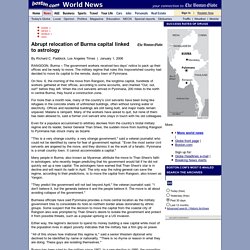
More time needed before expatriates consider relocating to Nay Pyi Taw. In its first property market report on Nay Pyi Taw in September, Picon-Deed stated that the administrative capital’s lighter traffic and cleaner air in comparison to Yangon could attract embassies and international organisations to relocate there.
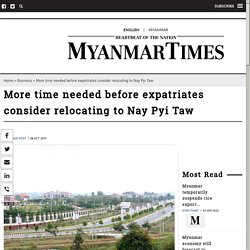
Yet complete relocation could take “as long as 10 years” due to bureaucratic procedures and the convenience Yangon currently offers. “Administrative capitals tend to have a slow build up where diplomatic missions tend to wait [before moving],” Tony Picon from Picon-Deed. However, that changes “when a few important movers – typically the larger embassies – make a decision to relocate.”
More time needed before expatriates consider relocating to Nay Pyi Taw. Govt Calls for Foreign Investment in ‘Death Highway’ Upgrade. The Ministry of Construction is seeking local and overseas interest in upgrading the notoriously dangerous stretch of road between Rangoon and Mandalay.
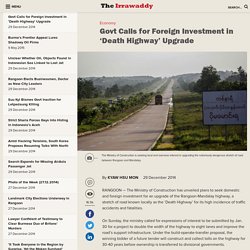
By Kyaw Hsu Mon 29 December 2014 RANGOON — The Ministry of Construction has unveiled plans to seek domestic and foreign investment for an upgrade of the Rangoon-Mandalay highway, a stretch of road known locally as the ‘Death Highway’ for its high incidence of traffic accidents and fatalities. On Sunday, the ministry called for expressions of interest to be submitted by Jan. 30 for a project to double the width of the highway to eight lanes and improve the road’s support infrastructure. Under the build-operate-transfer proposal, the winning bidder of a future tender will construct and collect tolls on the highway for 30-40 years before ownership is transferred to divisional governments.
The road rule costing Myanmar billions. Transport and logistics companies are questioning the ban on trucks on the Yangon-Mandalay Expressway, arguing that it costs time and money and puts lives at risk.

By THOMAS MANCH & KYAW LIN HTOON | FRONTIER LAST MONTH, Mr Paul Apthorp drove up and down the Yangon-Mandalay Expressway, a four-lane highway that links the country’s two main cities. Naypyidaw Journal: Silence Wraps Myanmar’s Capital. NAYPYIDAW, Myanmar — The road leading to Myanmar’s giant Parliament building is 20 lanes wide, well suited for military processions but eerily empty the rest of the time.
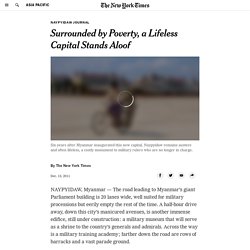
A half-hour drive away, down this city’s manicured avenues, is another immense edifice, still under construction: a military museum that will serve as a shrine to the country’s generals and admirals. Across the way is a military training academy; farther down the road are rows of barracks and a vast parade ground. Motorbike ban to be expanded in NPT. Web wide crawl with initial seedlist and crawler configuration from March 2011.
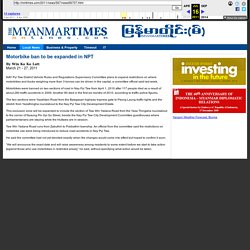
This uses the new HQ software for distributed crawling by Kenji Nagahashi. Myanmar opens international airport in new capital. Construction of Myanmar new capital continues. Govt urges Nay Pyi Taw move for embassies, but obstacles remain. Daw Aung San Suu Kyi says Myanmar needs to improve services in Nay Pyi Taw to entice foreign embassies to shift from Yangon, but even government officials admit that the move will be a tough sell for many years.

By SU MYAT MON | FRONTIER THE GOVERNMENT is moving ahead with plans to encourage the transfer of foreign embassies from Yangon to Nay Pyi Taw – a move that gained some momentum last week when Brunei Darussalam signed an agreement that would, in principle, see it shift its diplomatic presence to the capital. A deal for the “reciprocal exchange of land for the construction of diplomatic presences” between the countries was signed on February 14 by Brunei’s ambassador to Myanmar, Mr Abdu’r Rahmani bin Dato Paduka Haji Basir, and Ministry of Foreign Affairs permanent secretary U Myint Thu.
The agreement “aims to support the relocation of the Embassy of Brunei Darussalam to Nay Pyi Taw Diplomatic Zone”, said an article in the state-run Global New Light of Myanmar on February 15. China embassy opens interim liaison office in Nay Pyi Taw. “I want to say that, officially opening this office branch holds a great meaning to the China-Myanmar relationship,” Chinese Ambassador Hong Liang said at the opening ceremony of the office on September 8.
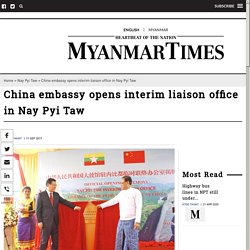
The liaison office is the first foreign office to be permitted to open in Nay Pyi Taw and it holds a lot of meaning for the 67-year-old diplomatic relationship between China and Myanmar, Hong added. China and Myanmar began a diplomatic relationship on June 8, 1950, and the Chinese embassy was first opened in Yangon on June 28, 1950. Minister of State for Foreign Affairs of Myanmar U Kyaw Tin hailed the opening of the liaison office to a more strategic partnership between the two countries. Official residences in Nay Pyi Taw left to ruin. Many of the official residences built at considerable expense for ministers and deputy ministers are sitting empty in overgrown compounds.

By NANDA and YE MON | FRONTIER Photos HKUN LAT Nay Pyi Taw, whose name means “Abode of Kings”, is often derided as a “ghost city” and is inextricably linked in the public’s imagination to the oppressive military regime of Senior General Than Shwe, which built the city in secret. However, when it replaced Yangon as the national capital in late 2006, it was conceived as a new city for a new era. Myanmar’s Remote Capital Is Still a Work in Progress. NAYPYIDAW, Myanmar, Oct. 4 — This may be the world’s only national capital without cellphone service or international flight connections.
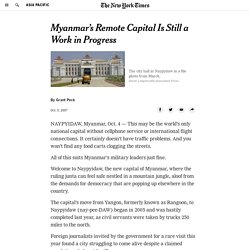
It certainly doesn’t have traffic problems. And you won’t find any food carts clogging the streets. All of this suits Myanmar’s military leaders just fine. Welcome to Naypyidaw, the new capital of Myanmar, where the ruling junta can feel safe nestled in a mountain jungle, aloof from the demands for democracy that are popping up elsewhere in the country. The capital’s move from Yangon, formerly known as Rangoon, to Naypyidaw (nay-pee-DAW) began in 2005 and was hastily completed last year, as civil servants were taken by trucks 250 miles to the north.
Living in a ghost town. Rice fields and villages, where time seems frozen, are passing by through the dirty windows of the low-speed train. May Thet, 27, is trying hard not to doze off in this crowded old two-carriage train donated by Japan, which left from Naypyidaw, the new Burmese capital, a few hours ago. TRAFFIC-FREE: Many kilometres of empty roads stretch through the empty capital. Like almost everyone on the train, she's heading to Kyaukpadaung, in central Burma, to attend the famous Mount Popa festival. "I'm so excited to go back to my hometown. It's like breathing again. For a little more than three years, she's been working in the "City abode of kings" as a junior employee in the Ministry of National Planning and Economic Development. NAYPYIDAW. En reportage à Nay Pyi Taw avec des étudiants du Myanmar Journalism Institute (MJI)
Après trois jours de recherche et de définition de sujets à Rangoun avec CFI, les étudiants sont partis en reportage pendant dix jours dans la capitale pour réaliser un magazine d'une vingtaine de pages, deux sujets radio et deux reportages de télévision, qui seront diffusés dans les médias birmans. Accompagnés de leurs formateurs birmans et de trois formateurs internationaux, ils ont pu approfondir leur expérience du terrain et leurs connaissances techniques des médias traditionnels afin de mieux se préparer à leur entrée sur le marché du travail. Les reportages effectués touchent aux questions posées par la transition démocratique que connaît le pays actuellement. Les étudiants ont focalisé leurs reportages sur la gestion des ressources énergétiques, l'accès à la représentation politique ou encore les espoirs de la population locale.
Ils ont également axé leurs recherches sur l'impact de la naissance de la capitale birmane sur la population locale. Welcome To Nay Pyi Taw. Avec le cinéma sonore, la Maison de la radio propose de découvrir l’univers du son spatialisé dans un format « séance de cinéma ». Plongés dans le noir, les spectateurs découvriront ou redécouvriront les productions radiophoniques dans un contexte exceptionnel d'écoute en immersion totale. Une véritable invitation au voyage imaginaire. Nay Pyi Taw, la ville vide. Nay Pyi Taw, la nouvelle capitale (R) - Ép. 5/0 - Myanmar.
Nay Pyi Taw, une résidence royale pour l’armée birmane, Guy Lubeigt. Guy Lubeigt, Général Ne Win, dictature en Birmanie, dictature au Myanmar, Ligue Nationale pour la Démocratie, capitale birmane Nay Pyi Taw, Olivier Richard, Ambassadeur de France en Birmanie, Pauline Autin, Expatriés au Myanmar, Expatriés en Birmanie, Fra. Rencontre avec un érudit de culture birmane, auteur de nombreux ouvrages ? Une centaine -. Burma's bizarre capital: a super-sized slice of post-apocalypse suburbia.
Driving through Naypyidaw, the purpose-built capital of Burma, it could be easy to forget that you’re in the middle of one of south-east Asia’s poorest countries. On either side of the street, a seemingly endless series of giant detached buildings, villa-style hotels and shopping malls look like they have fallen from the sky, all painted in soft pastel colours: light pink, baby blue, beige. The roads are newly paved and lined with flowers and carefully pruned shrubbery.
Meticulously landscaped roundabouts boast large sculptures of flowers. The scale of this surreal city is difficult to describe: it extends an estimated 4,800 square kilometres, six times the size of New York City. Birmanie 3/5. Une capitale pharaonique et fantomatique. Imaginez que votre supérieur vous annonce que vous avez quelques jours pour faire vos bagages, quitter votre famille et vous installer dans une ville nouvelle construite en secret à des centaines de kilomètres de là, en milieu hostile…
Birmanie. Bienvenue à Naypyidaw, la capitale la plus étrange au monde. Deux reporters du quotidien britannique The Guardian explorent Naypyidaw, construite de toutes pièces en 2005 par l’armée birmane au milieu de la jungle.